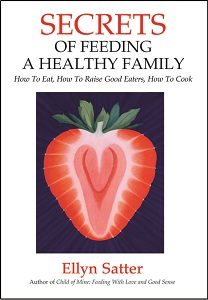

Family Meals Focus
The Ellyn Satter Institute Newsletter
Applying the Satter Eating Competence Model to Regulation of Food Intake
by Ellyn Satter, MS, MSSW, Dietitian and Family Therapist
For a PDF of this issue click here
People who have good food regulation attitudes and behaviors are confident they will get enough to eat and trust their feelings of hunger, appetite, and satiety to guide them how much to eat.1 High ecSI 2.0 scores, which indicate Eating Competence, correlate with lower BMIs, higher physical activity, and, most importantly, greater satisfaction with their weight.2 Internally regulated eating is linked to lower BMI3 and greater weight stability, whereas rigid or flexible external control is linked to unstable body weight.4
Internally regulated eating
As Eating Competence decreases, restraint and disinhibition increase along with drive for thinness, body dissatisfaction, and bulimia.
The body knows how much to eat. In fact, having enough to eat is essential to eating’s rich reward. Being hungry and eager to eat can feel positive and exciting on the one hand, or negative and distressing on the other. The difference lies in being confident that hunger and appetite will be satisfied: that it is possible to dependably look forward to getting enough to eat of rewarding food. Many if not most people fear hunger, all-too-many because of food insecurity, but also many from a sense of obligation to undereat and strive to weigh less. The irony is that food restriction and the fear of hunger are profoundly disruptive of food regulation because they can be tolerated for only so long. Then, rather than eating enough, loss of control and guilt can lead to disinhibited eating—eating a great deal, generally of food-to-be-avoided. The greater the restriction, the greater the likelihood, intensity, and frequency of disinhibition.
Restrained eating
Over half of adults diet to lose weight at any one time: 56% of women, 42% of men. Weight-reduction dieters routinely strive to overrule their body cues in the attempt to control or modify their biologically determined body weight. The Dietary Guidelines don’t directly recommend weight reduction diets, but they do emphasize achieving and maintaining an adult BMI that is at the mean of the bell curve. For those whose BMI doesn’t comfortably fit under this small umbrella, the Guidelines encourage and demonstrate eating a diet that is high in fruits, vegetables, and whole grains and low in fat and sugar. Such an eating pattern is by its nature low in calories.
In short, the Dietary Guidelines outline restrained eating, an eating behavior that is highly correlated with dietary disinhibition: overeating by suspending controls with respect to type and amount of food. Among many negative consequences, dietary restraint does harm by disrupting energy homeostasis and causing weight gain as well as the demoralization that accompanies out-of-control eating. The degree of harm appears to depend on the degree of restraint. Some argue that dietary restraint is not the same as dieting, and that restraint is beneficial for weight control.5 They postulate that flexible restraint is different from rigid restraint and that flexible restrained eaters disinhibit less.6
Eating Competence puts restrained eating into perspective
Factoring in the Satter Eating Competence Model allows interpreting dietary restraint from the perspective of fundamental processes in eating. ecSI 2.0 items “I eat as much as I am hungry for” and “I eat until I feel satisfied” describe and assess internally regulated eating. ecSI 2.0 validation studies found that roughly a third of US adults score in the Eating Competence range of 32 or above. Another third score 16 or below. As Eating Competence decreases, restraint and disinhibition increase along with drive for thinness, body dissatisfaction, and bulimia.7, 8 Eating Competence can be a matter of degree, but crossing the line from internally regulated eating to restrained eating is a profound shift that takes away trust in one’s own body. From there on, distortion in internal regulation is a gradual downwards slide that can be tracked clinically.
Restraint begins with mild to moderate overruling of internal regulators and attempts to manipulate biologically determined body weight. Restraint progresses to frankly dysfunctional eating: rigidity, extreme external food regulation, and serious dissatisfaction with body weight. After that, it is a small step to an eating disorder: extreme insensitivity to body cues, rigid external food regulation, and inflexible and unattainable weight standards. Of course, to qualify as an eating disorder, the distorted eating and/or weight-seeking has to be unconsciously used as a means of attempting to resolve or distract from seemingly unsolvable life issues.
Addressing restrained eating
Addressing restrained eating involves restoring Eating Competence, with particular attention to internal regulation attitudes and skills. Strategies depend on the individual’s degree of restraint.
Mild to moderate (flexible) restraint. The beginning stages of restrained eating can be addressed with consciousness-raising and introduction to the possibilities. Restraint can be so habitual that the individual is not even aware of their own shoulds and oughts and their chronic feelings of conflict and anxiety with respect to eating. Raise their consciousness by introducing the principle that the body knows how much to eat and what to weigh. Introduce the possibilities by giving permission to eat as much as they want of food they enjoy. Experientially based reading material9, 10 and/or an educational session11 or two can help. From the EC perspective, structure is essential for supporting internal regulation. When structure is in place, the experiential task becomes going to enjoyable meals (and snacks) hungry and eating with permission and attention until satisfied. Then stopping, knowing another meal or snack is coming soon and they can do it all over again.
Dysfunctional eating. Dieting Casualties are in this category, as are those who regularly purge as a way to regulate their weight, provided the dieting or purging isn’t for emotional regulation. Dieting Casualties are obligatory dieters with respect to how much they eat or what they eat—or both. Their attempts at restraint are extreme, and they can neither sustain restrained eating nor let go of it. Their struggles with eating are driven by conflict and anxiety about food and body weight. Their sensations of hunger, appetite, and satiety have been ignored and overruled so profoundly and for so long that they are often not even aware of them. When they attempt to give themselves permission to eat and access their internal regulators and eating enjoyment, they encounter deeply embedded negative feelings and memories. The “How to Eat” intervention taught in the Treating the Dieting Casualty VISION Workshop (TDC) helps them to access and resolve that negative self-awareness and regain access to their positive experience of hunger, appetite, and satiety.
Disordered eating. Successful psychotherapy allows direct access to emotions and underlying issues, decreases pressure on eating, and allows restrained eating to moderate. The “How to Eat” method is a critical last step in restoring Eating Competence for people who have recovered from the biopsychosocial sequalae of eating disorders. Without that final step of accessing and trusting their internal regulators, those recovering from an eating disorder are left with now-forbidden remnants of restrained eating. Those remnants continue to distort their relationship with food and undermine the stability of their body weight.
Treating the Dieting Casualty
Prepare yourself to provide the evidence-based, expert, and nuanced treatment your clients need to help them recover from dysfunctional eating. Graduates credit TDC with saving them for their profession, transforming their clinical thinking and methods, and positioning their practice for greater financial returns. ESI is committed to joyful and responsible eating and feeding and wants you to have this training. Ask us about setting up a payment plan or a discount for your group.
References
- Satter E. Eating Competence: definition and evidence for the Satter Eating Competence Model. J Nutr Educ Behav. 2007;39:S142-S153. Computer.
- Satter E. The Satter Eating Competence Model: the Satter approach to eating Ellyn Satter Institute. Accessed February 2, 2022. https://www.ellynsatterinstitute.org/satter-eating-competence-model/
- Camilleri GM, Méjean C, Bellisle F, et al. Intuitive eating is inversely associated with body weight status in the general population-based NutriNet-Santé study. Obesity. 2016;24:1154-1161.
- Tylka TL, Calogero RM, Daníelsdóttir S. Intuitive eating is connected to self-reported weight stability in community women and men. Eating Disorders. 2020;28:256-264.
- Schaumberg K, Anderson DA, Anderson LM, et al. Dietary restraint: what’s the harm? A review of the relationship between dietary restraint, weight trajectory and the development of eating pathology. Clin Obes. 2016;6:89-100.
- Westenhoefer J, Engel D, Holst C, et al. Cognitive and weight-related correlates of flexible and rigid restrained eating behaviour. Eat Behav. Jan 2013;14(1):69-72.
- Krall JS, Lohse B. Validation of a measure of the Satter Eating Competence model with low-income females. Int J Behav Nutr Phys Act. 2011;8. doi:10.1186/1479-5868-8-26 PMC3094263,
- Lohse B, Satter E, Horacek T, et al. Measuring Eating Competence: psychometric properties and validity of the ecSatter Inventory. J Nutr Educ Behav. 2007;39:S154-S166.
- Satter EM. Section 1: How to eat Secrets of Feeding a Healthy Family. Kelcy Press; 1999. https://www.ellynsatterinstitute.org/product/secrets/
- Satter E. Feeding Yourself with Love and Good Sense. Kelcy Press; 2020. https://www.ellynsatterinstitute.org/product/feeding-yourself-with-love-and-good-sense-grouped/
- Satter E. Family Meals Focus #28: Counseling with the Satter Eating Competence Model. Accessed May 20 2021. https://ellynsatterinstitute.org/family-meals-focus/28-counseling-with-eating-competence/
Explore
For more about trusting your natural drive to eat as much as you want rather than fighting against it, read chapter 4, “Eat as much as you want,” in Ellyn Satter’s Secrets of Feeding a Healthy Family.
Related issues of Family Meals Focus
- Eating competence
- Eating competence: Context-management skills
- Eating competence: Eating attitudes
- Eating competence: food acceptance
- Eating competence: putting it all together
- Counseling with the Satter Eating Competence Model
- Emotional eating
- Versions of internally regulated eating

